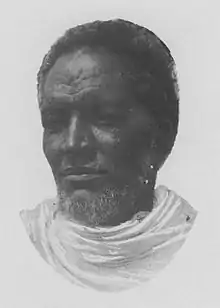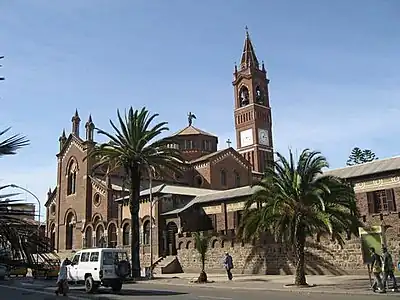Portal:Eritrea
The Eritrea Portal
Eritrea (/ˌɛrɪˈtriː.ə, -ˈtreɪ-/ ( Human remains found in Eritrea have been dated to 1 million years old and anthropological research indicates that the area may contain significant records related to the evolution of humans. Contemporary Eritrea is a multi-ethnic country with nine recognised ethnic groups. Nine different languages are spoken by the nine recognised ethnic groups, the most widely spoken language being Tigrinya, the others being Tigre, Saho, Kunama, Nara, Afar, Beja, Bilen and Arabic. Tigrinya, Arabic, and English serve as the three working languages. Most residents speak languages from the Afroasiatic family, either of the Ethiopian Semitic languages or Cushitic branches. Among these communities, the Tigrinyas make up about 55% of the population, with the Tigre people constituting around 30% of inhabitants. In addition, there are several Nilo-Saharan-speaking Nilotic ethnic groups. Most people in the country adhere to Christianity or Islam, with a small minority adhering to traditional faiths. Eritrea is one of the least developed countries. It is a unitary one-party presidential republic in which national legislative and presidential elections have never been held. Isaias Afwerki has served as president since its official independence in 1993. According to Human Rights Watch, the Eritrean government's human rights record is among the worst in the world. The Eritrean government has dismissed these allegations as politically motivated. Freedom of the press in Eritrea is extremely limited; the Press Freedom Index consistently ranks it as one of the least free countries. As of 2022 Reporters Without Borders considers the country to have the overall worst press freedom in the world, with the sole exception of North Korea, as all media publications and access are heavily controlled by the government. Eritrea is a member of the African Union, the United Nations, and the Intergovernmental Authority on Development, and is an observer state in the Arab League alongside Brazil and Venezuela. (Full article...) Selected article -.svg.png.webp) Italian Eritrea (Italian: Colonia Eritrea, "Colony of Eritrea") was a colony of the Kingdom of Italy in the territory of present-day Eritrea. The first Italian establishment in the area was the purchase of Assab by the Rubattino Shipping Company in 1869, which came under government control in 1882. Occupation of Massawa in 1885 and the subsequent expansion of territory would gradually engulf the region and in 1889 borders with the Ethiopian Empire were defined in the Treaty of Wuchale. In 1890 the Colony of Eritrea (Italian: Colonia Eritrea) was officially founded. In 1936 the region was integrated into Italian East Africa as the Eritrea Governorate. This would last until Italy's loss of the region in 1941, during the East African campaign of World War II. Italian Eritrea then came under British military administration, which in 1951 fell under United Nations supervision. In September 1952 it became an autonomous part of Ethiopia, until its independence in 1991. (Full article...)Selected picture - The Cinema Impero is an Art Deco-style cinema in Asmara, the capital of Eritrea. It was built in 1937 by the colonial authorities in Italian Eritrea.
Did you know -
CategoriesCategory puzzle Select [►] to view subcategories
Eritrea Eritrea-related lists Eritrean culture Economy of Eritrea Education in Eritrea Environment of Eritrea Geography of Eritrea Government of Eritrea Health in Eritrea History of Eritrea Organisations based in Eritrea Eritrean people Politics of Eritrea Society of Eritrea Eritrea stubs Related portalsWikiProjects
General images - Topics in EritreaSelected panorama -Associated WikimediaThe following Wikimedia Foundation sister projects provide more on this subject:
SourcesDiscover Wikipedia using portals
| |||||
.svg.png.webp)






.jpg.webp)





_crowned.svg.png.webp)

.jpg.webp)

